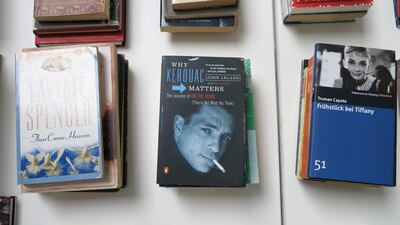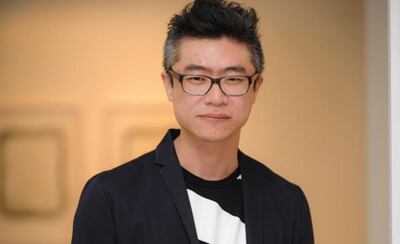Buying books is the easy part, getting round to reading them requires a bit more effort. So it's hardly surprising that most of us have shelves (and shelves) spilling over with books we promised ourselves we'd read but then… didn't. The spines remain conspicuously uncracked, the corners of each page pristine. "No more," you tell yourself, like an addict confronting their demons. But still the pile grows. It's such a serious affliction, the Japanese even have a word for it. "Tsundoku" is a combination of several words, including "tsunde", which means "to pile up", and "oku", which translates as, "to leave for a while".
Fortunately, help is at hand. Singaporean artist Heman Chong has collaborated with Renee Staal of the National Gallery Singapore to create The Library of Unread Books. This 10-year project, which launched in Singapore in 2016 and arrives in Dubai in November, is a series of individual libraries made up entirely of donated books that the original owners never managed to read.
Earlier this summer, the Jameel Arts Centre put out an open call to UAE residents to donate their unread books, so now is the time to clear some room before your inevitable next trip to a bookstore. Do the right mental gymnastics and it's almost as if you can get someone else to do your reading for you. Added to this, everyone who contributes receives a lifetime, worldwide membership to The Library of Unread Books, so you can come and browse (although you cannot sign books out), safe in the knowledge that you are not the only one suffering from "tsundoku".
But there is a more serious side to this project. The Library of Unread Books asks tricky questions about ownership and the relationship between wealth and knowledge. In many ways, these donations democratise that relationship. “The Library of Unread Books is a living reference library that traces the perimeters of excess knowledge, where every single volume was once private property and has been donated by a person who did not read it when it was in their possession,” says Chong. “The unread book symbolises a potential way of expressing generosity by opening this book up to the public and forming connections between strangers.”
There is also the startlingly obvious – but oft-overlooked – point that unread books, by their very nature, hold the potential for learning in a way that a read book never can. Italian novelist Umberto Eco kept a library of tens of thousands of books, but bristled at the suggestion these were a means to show off his knowledge. Quite the opposite. He treated his library as a research tool. The more unread books he possessed, the more new information there was to absorb.
Lebanese-American scholar Nassim Nicholas Taleb picks up this thread and mentions Eco in his book The Black Swan: The Impact of the Highly Improbable. "Read books are far less valuable than unread ones," Taleb writes. "The library should contain as much of what you do not know as your financial means, mortgage rates and the currently tight property market allows you to put there."
What is so interesting about The Library of Unread Books, then, is that it confronts Taleb’s assertion that access to unread books is dependent on “financial means”. “We would like to talk about what kind of value can be shared, for free, between people,” says Chong. “A library is a shared public space, where you can feel safe and engaged and included.”
It is not simply the fact all of the books are unread, which differentiates this library from most others, however. The titles are not arranged by genre or the names of authors – they are simply stacked up in higgledy-piggledy piles. In part, this encourages visitors to pick up and put down books wherever and whenever they like. "During the course of the exhibition, they will move around a lot," says Chong. "It's a real mess."
But this refusal to index also has the effect of forcing people to engage with books they might ordinarily ignore. “In this chaos and disorder, people will encounter something they might not intentionally want to read but will,” says Chong. “So every encounter is surprising. There are no binary or opposing ideas in our library. Nothing is right or wrong. You can read whatever you like and be whoever you want to be.”
Chong has played with similar ideas before. In 2015, for example, as part of a solo show at the South London Gallery, he placed a random selection of second-hand books in the gallery shop. He wanted visitors to "think about why these titles are in this bookshop, in this context". It is as if, through placing books in unexpected places, Chong gives them, and the knowledge within them, new life.
There is plenty of added intrigue in questioning why the person who donates a book to The Library of Unread Books never read it. What was it that attracted them to that book in the store? And why did that attraction fade? What does that tell us about our consumerist society? Maybe a lot; or maybe that person simply subscribed to Netflix. Each unread book has a different story and we will never know any of them. "We are always surprised by the books we get," says Chong. "We realise there's always a personal reason why someone didn't read a book."
The Library of Unread Books has already travelled from Singapore to Manila, Utrecht and Milan. But Chong says he believes Dubai is a particularly appropriate destination for the project. "It's actually quite similar to Singapore," he says. "Everyone is an immigrant, there are so many languages spoken in both cities. We hope to speak to this multicultural society. We hope that people from all races and classes, from all kinds of professions, will find a kind of home with The Library of Unread Books."
The Library of Unread Books will be at Jameel Arts Centre, Dubai, from Saturday, November 16 until Friday, January 31 next year. More information about the library or how to donate a book is available at www.jameelartscentre.org



